Let’s say you’ve got a solid marketing strategy in place to reach out to new customers. You’ve done the research and created the perfect customer profile. You’ve worked hours crafting compelling sales copy that ends with an irresistible call-to-action.
There’s just one problem: your email address.
To save on costs when starting your new business, you probably used a free email provider. So when your carefully crafted sales email lands in potential customers’ inboxes, they’re tempted to buy — they just don’t know if “YourBusiness@HotInbox.net” is legit. And who can blame them?
First impressions are a big deal in business. So, if you don’t have a custom email address, you may be missing out on a pretty simple improvement. Free email providers like Gmail or Yahoo are often easy, affordable solutions for your basic email needs. However, they lack the professionalism and credibility of a custom email domain.
In this article, we’ll discuss custom email addresses: what they are, why they’re so important, and how to get one for your small business.
Getting a custom email address is an excellent way to get your small business off to a great start. So, let’s jump right in.
What Is an Email Domain?
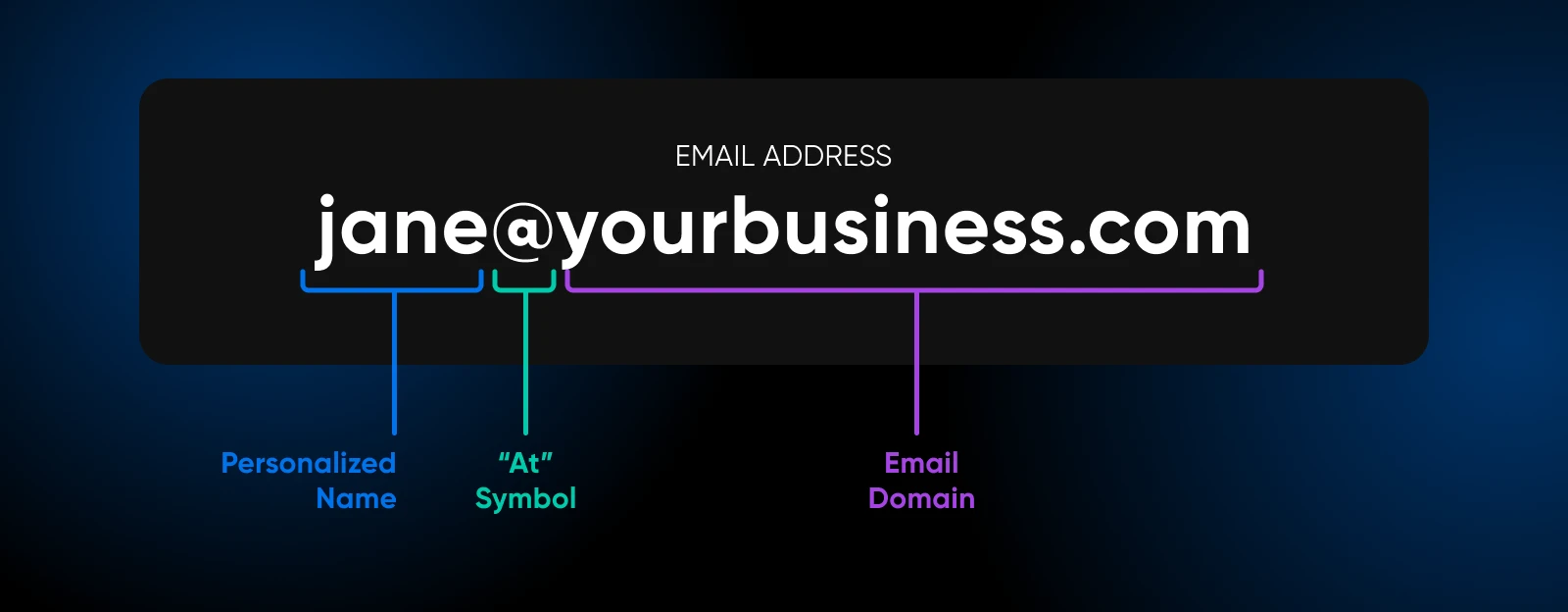
An email domain is the part of an email address that comes after the “@” symbol. It typically represents the email provider or a business’s name. For instance, “example.com” in john@example.com. Email domains help route emails to the correct recipients of your message.
What Is a Custom Email Domain?
A custom email domain is a personalized email address that uses your own domain name (e.g., “yourname@yourbusiness.com”) instead of a generic provider’s domain like Gmail or Yahoo.
This type of email address enhances your brand’s credibility and visibility, making your business appear more professional and trustworthy.
Why Is Having a Custom Domain Email Address Good for Your Business?
Having a custom domain email address offers businesses tons of benefits, including increased credibility and professionalism. It not only enhances your brand image but also provides better security and control over your communications.
Let’s explore the top nine reasons why a custom email address is essential for your small business.
1. It Gives You Better Brand Visibility
A custom email address boosts your brand visibility by incorporating your business name directly into your email communications. Every time you send an email, your brand name is front and center, making it easier for customers to remember you — and giving you the kind of repeated top-of-mind exposure that’s essential to building brand awareness.
2. It Lends Your Business Credibility
Customers are more likely to trust an email from “yourname@yourbusiness.com” than one from a generic provider like Gmail or Yahoo. A customized email address helps you look more professional and shows you’re serious about your business and willing to invest in its image.
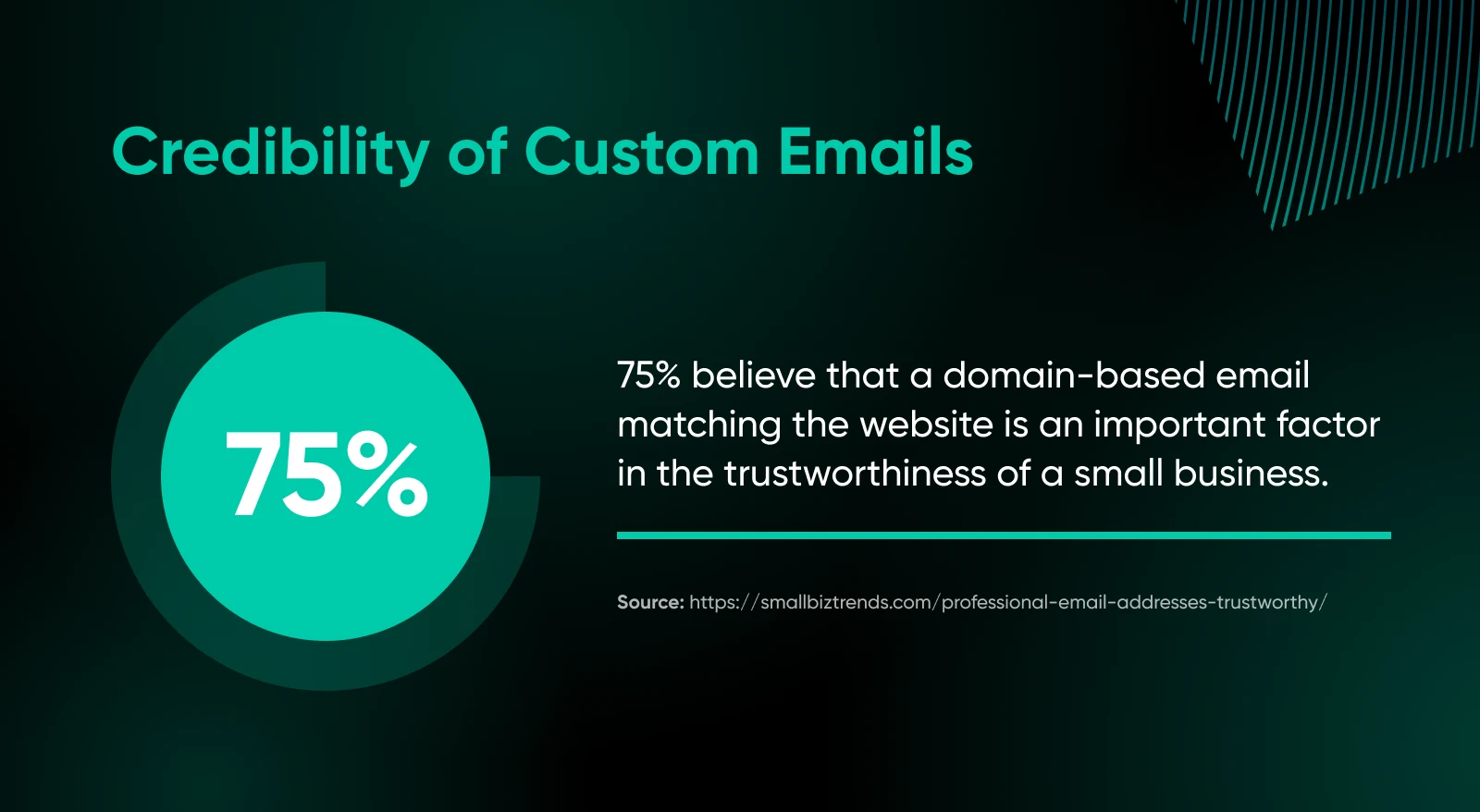
A survey by GoDaddy showed that 75% of consumers in the U.S. believe a domain-based email that matches your website is a very important factor in trusting an online small business.
A little extra credibility can make the difference between a potential customer choosing your business over a competitor’s.
3. It Creates Consistency Across Your Business’s Email Addresses
When you have a custom domain for your business’s email addresses, you can create a standardized format for emails across different employees or departments. For example, all employee email addresses can be “firstname@yourbusiness.com”, and all departments can be set up like “sales@yourbusiness.com” or “support@yourbusiness.com.”
This kind of consistency not only looks more polished, but also helps customers easily identify and reach the right contact within your business (especially as it grows). According to the Radicati Group, the average office worker sends and receives 126 business emails per day, so any method of streamlining professional communication can help us all stay organized and on top of our inboxes.
4. It’s a Cost-Effective Brand Marketing Tool
Investing in a custom email domain is a cost-effective way to market your brand. Unlike other marketing strategies that require continuous investment, setting up a custom email address is a relatively low cost that continues to promote your brand with every email you send.
Email marketing consistently ranks as one of the highest ROI channels — businesses earn an average of $42 for every dollar spent on email marketing, according to Codecrew. This makes a custom email domain well worth the investment.
5. It Increases Your Security
Using a custom email domain is more secure than using a free email provider because free email services are often targeted by phishing attacks and spam. On the other hand, when you use a custom domain, you get greater control over your email security settings and can implement stronger safeguards to protect your business communications.
According to Verizon’s Data Breach Investigations Report, 94% of malware is delivered via email, which shows just how important it is to take email security seriously in the digital age. Custom domains provide an extra layer of security, not just for your business, but for your customers as well.
6. It Gives You More Freedom and Control
A custom email domain grants you the freedom to change email providers without the hassle of changing all of your email addresses. If your current email provider fails to meet your expectations or goes out of business, you can seamlessly migrate to another provider without losing access to your email addresses — your business is less affected and your brand doesn’t lose visibility.
7. It Gives You Freedom To Create As Many Email Addresses As You Want
One of the major advantages of a custom email domain is the ability to create an unlimited number of email addresses under your domain. This can be very useful for small businesses that plan to grow rapidly. It also allows you to create unique email addresses for different departments, roles, or employees. For example, you can set up addresses such as “sales@yourbusiness.com,” “support@yourbusiness.com,” and “hr@yourbusiness.com.”
8. It Makes Your Emails More Likely to Stay out of Spam
According to a report by Return Path, about 20% of legitimate marketing emails end up in spam folders.
Using a custom email domain can improve the deliverability of your emails by making them less likely to be marked as spam. This is because emails sent from custom domains are perceived as more credible and reliable compared to those sent from generic ones like Gmail or Yahoo.
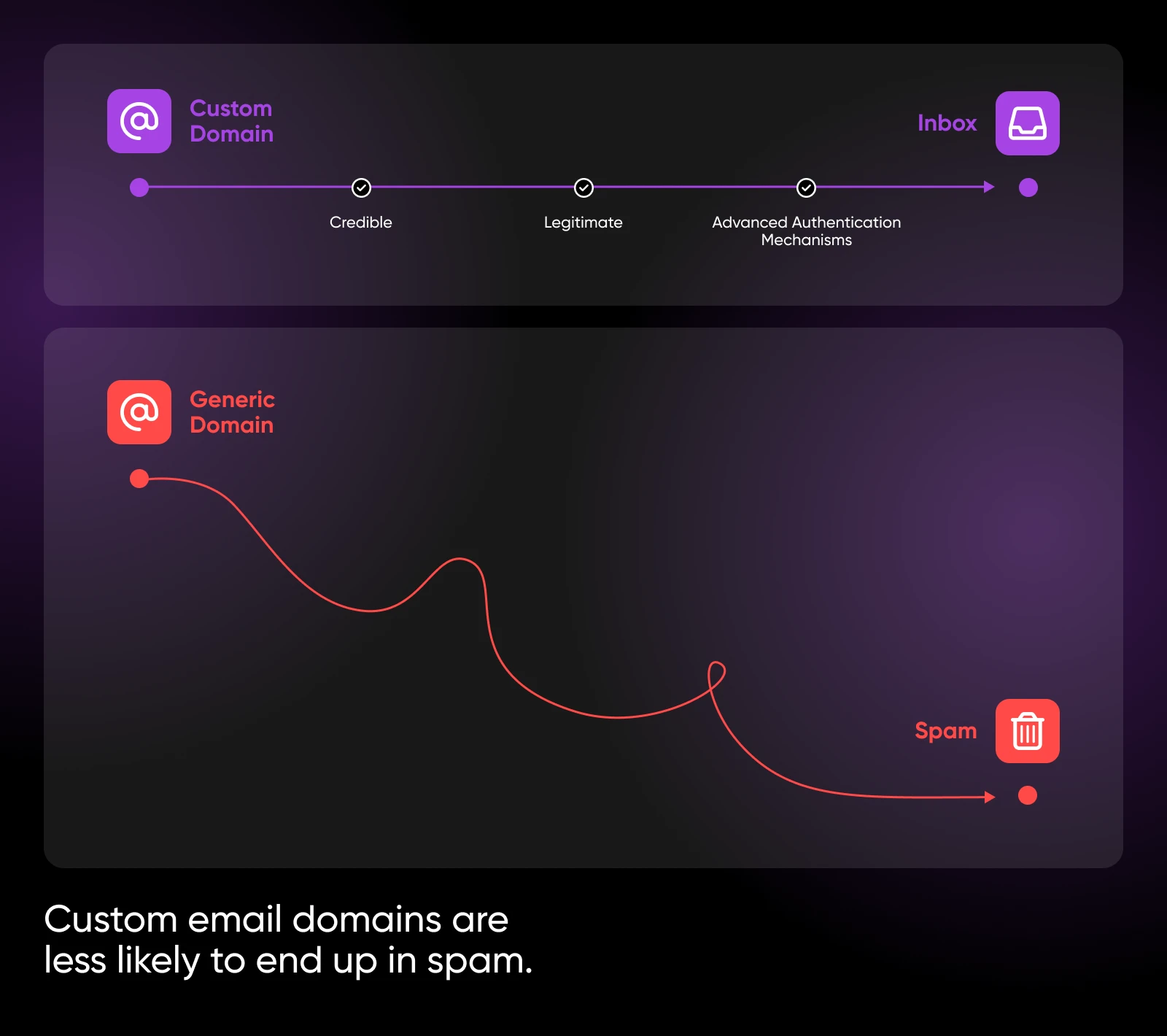
In addition to boosting credibility, custom domains may come with advanced authentication mechanisms such as SPF, DKIM, and DMARC, which help verify that your emails are legitimate and further improve their deliverability.
9. It Often Comes With Other Useful Tools
Custom email domain services may come bundled with additional tools that can enhance productivity and streamline business operations. For example, services like Google Workspace and Microsoft 365 offer not only email hosting, but also access to a range of applications such as shared calendars, task management tools, video conferencing, contact lists, and document collaboration platforms.
These integrated tools can help businesses of all sizes facilitate better communication and collaboration by managing their team schedules, sharing files, coordinating tasks, and more.
Some custom domain platforms even offer CRM integrations, which can help your business manage customer relationships and track service interactions directly from your email app.
Custom Email Domains: Pros and Cons
| Pros | Cons |
| Professionalism: A custom email domain conveys a more professional image, helping to build trust with customers and partners. Brand recognition: Every email sent from your domain reinforces your brand, boosting its visibility and recognition. Control and security: Owning your domain allows you to implement stronger security measures and data protection protocols. Better deliverability: Custom domains are less likely to be marked as spam, which improves email deliverability rates. Flexibility: You can create multiple email addresses for different departments or roles, and streamline communication. | Cost: Setting up and maintaining a custom email domain involves additional costs compared to free domains. Technical setup: The initial setup and ongoing management require some technical know-how or hiring of IT services. Maintenance: Regular maintenance and updates are necessary to preserve security and optimal performance. Dependence on providers: Switching providers can be complex and may disrupt your email services temporarily. Learning curve: There may be a learning curve for you and your team to adapt to new email management tools and protocols. |
How To Come Up With Custom Email Addresses for Your Business
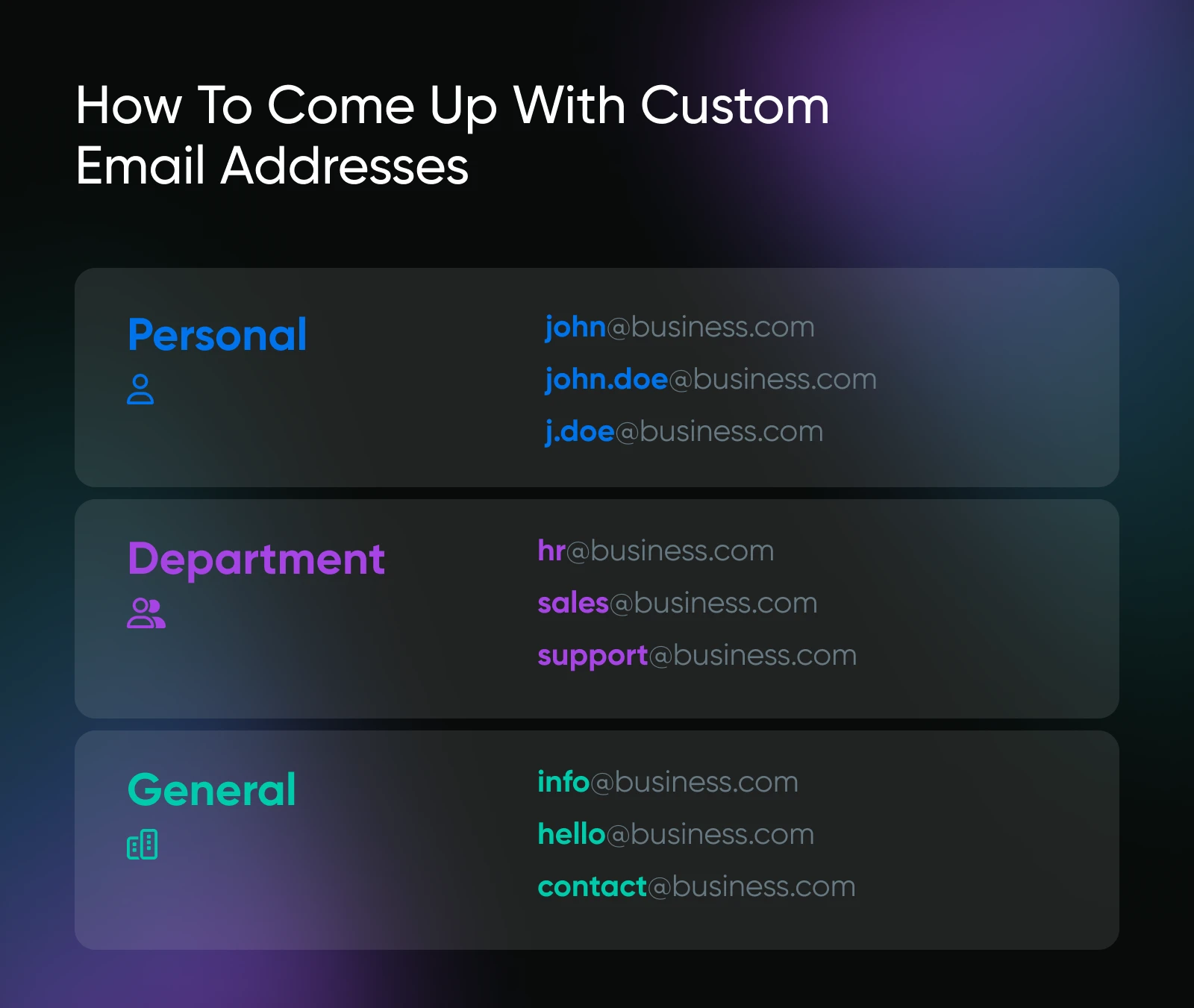
Creating personalized email addresses for your business is an important step in establishing a professional online presence.
Here are some tips to help you come up with effective and organized email addresses:
- Use your domain name: Make sure all your custom email addresses use your business’s domain name (e.g., “yourname@yourbusiness.com”) This reinforces your brand’s trustworthiness and makes your communications look professional.
- Keep it simple and professional: Use simple and straightforward addresses that are easy to remember and spell. Avoid using nicknames, numbers, or special characters. For example, use “john@yourbusiness.com” instead of “john123@yourbusiness.com.”
- For individual employees: Use the first name, last name, or a combination of both. Common formats include: “john@yourbusiness.com,” “john.doe@yourbusiness.com,” or “j.doe@yourbusiness.com.” This makes it easy for clients to contact specific team members.
- For departments: Be consistent. Examples include “sales@yourbusiness.com,” “support@yourbusiness.com,” and “hr@yourbusiness.com.” This makes it easier to get inquiries directed to the correct department.
- Create a general purpose email address: This is for general inquiries. Examples include “info@yourbusiness.com” or “contact@yourbusiness.com.”
How To Get a Custom Email Address for Your Small Business
Creating a personalized business email address is a pretty straightforward process.
Follow these steps to get started:
Step 1: Choose a Domain Name
If you already own a domain, you can skip this step. But if you’re starting from scratch and don’t have a domain name yet, the first thing to do is choose and buy a new domain for your email address.
Choose a domain name that reflects your business. It should be easy to remember, spell, and relevant to your brand (e.g., “www.yourbusiness.com”). Then, use a domain registration service to check if your preferred domain name is available. If it isn’t, you’ll have to pick something else.
Consider alternative names, variations, or different spellings.
Once you’ve found an available domain name, register it through a domain registration service or web hosting provider. This typically requires you to create an account and pay a yearly registration fee.
Domain Registrar
A domain registrar is an organization that manages domain registration for Top-Level Domain (TLD) registries. Registrars provide registration services and sell domain names to registrants.
Read MoreDreamHost offers multiple hosting plans starting at just $2.95/month. Some plans include unlimited emails, while others offer it as an add-on for as little as $1.67/ month. All plans include our award-winning customer support and 100% uptime guarantee.
Step 2: Select an Email Hosting Provider
If your web hosting service doesn’t offer email hosting (or you don’t want to use its included service), the next step is to choose an email hosting provider for your new email address. There are many reputable providers that allow users to create professional email addresses. Some popular options include Google Workspace, Microsoft 365, Outlook.com, and Zoho Mail.
Compare the features and pricing of different plans offered by the email hosting provider. Then, choose a plan that suits your business needs and budget. Finally, sign up for the service.
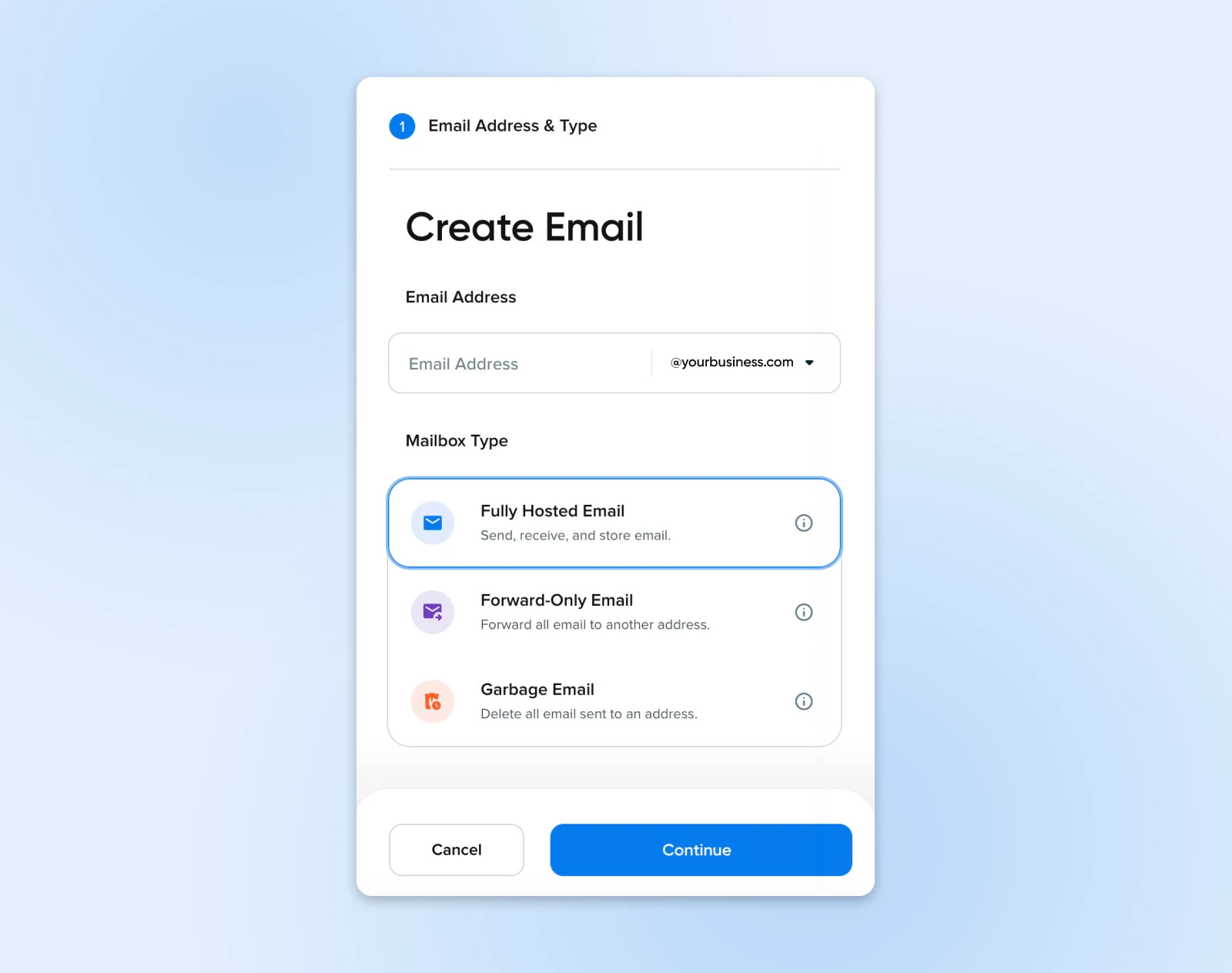
Step 3: Set Up Your Email Account
Log in to the admin console of your email hosting provider using the account you created during signup. Follow the provider’s instructions to add your domain to the email hosting service. To do this, you’ll usually need to verify domain ownership by updating DNS records through your domain registrar.
DNS
The Domain Name System (DNS) protocol keeps records of which domain names correspond to specific IP addresses. DNS enables you to browse the web by typing in regular URLs instead of IP addresses.
Read MoreIn the admin console, create custom email addresses for yourself and your employees. For example, you might create “john@yourbusiness.com” for yourself and “sales@yourbusiness.com” for your sales department.
Configure your email clients (e.g., Outlook, Apple Mail, or mobile email apps) so you can send or receive emails using your new personalized email addresses. The email hosting provider will provide the necessary settings: IMAP/POP3 and SMTP server details.
If needed, set up email forwarding to direct emails from one address to another. Also, make sure you create email aliases so you can receive emails from different variations of your email address without having to set up separate accounts.
Frequently Asked Questions About Custom Email Addresses for Small Businesses
How much does a custom email address cost?
The cost can vary, depending on the email hosting provider and the plan you choose. Basic plans may cost as little as a few dollars per month, while choosing a higher-tier plan with additional features can increase the cost.
Can I get a free custom email address?
Well, Sort of. It’s unlikely that you’ll be able to find a legitimate hosting provider where you can create a custom email address without paying anything. Although, if you use a web hosting provider like DreamHost, you get unlimited emails with certain web hosting plans. Don’t have a domain name yet? We include a free domain for you.
Alternatively, you can migrate an existing domain to DreamHost to take advantage of our full-service email hosting and other perks.
Can I use a custom email address with existing email clients?
Yes, you can configure your custom email address to work with most popular email clients, such as Outlook, Apple Mail, and mobile email apps. Email hosting providers usually provide the necessary settings (IMAP/POP3 and SMTP server details) and instructions to help you set up your email clients.
What security features should I look for in an email hosting provider?
When choosing an email hosting provider, look for security features like two-factor authentication (2FA), spam filtering, and email encryption. Make sure the provider also supports email authentication protocols like SPF, DKIM, and DMARC to protect against email spoofing and phishing attacks.
Can I switch email providers and keep my custom email address?
Yes, you can switch email providers and keep your custom email address. Usually, you’ll need to migrate your email data from the old provider to the new one and update your domain’s DNS settings to point to the new provider’s servers. Most email hosting providers offer migration tools or services to assist you with this process.
What happens if my preferred domain name is already taken?
If your preferred domain name is already taken, consider variations or alternatives that still align with your brand. You might add keywords related to your business or use different extensions like “.net” or “.biz.”
What should I do if I forget to renew my domain?
If you forget to renew your domain, your email services may be temporarily disrupted. Most domain registrars offer a grace period for renewal. But it’s best to avoid this altogether — set up auto-renewal or reminders to renew your domain.
Professional Email @yourdomain
You may have quickly launched a small business with a free Gmail account. However, research shows email usage does not appear to be declining anytime soon. If you’ve been wondering about how to grow your business with email marketing, creating a custom address is a great way to make an impact.
Setting up your DreamHost email hosting plan is as simple as following a few easy steps:
- Select a monthly or yearly plan.
- Register a new domain, use an existing domain, or decide later which domain to use.
- Provide payment information and select how many email boxes you need.
- Complete your email set up in your new email administration panel.
For less than the cost of a monthly latte habit, you can boost your brand with a custom email address and improve your business’s professional appearance.
Ready to crank up your email address’s professionalism and marketing power? Whether you’re looking for a complete hosting solution or want to try our cost-effective email-only plan, DreamHost is here to help you take your business to the next level!

Google Workspace Offered by DreamHost
Work together from anywhere! Current DreamHost customers can try it free for 30 days.
Get Started
